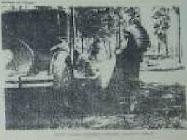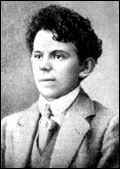You can do these google searches on HG Poetics & come up with some strings of ideas... but I don't think they go back through the entire blog... or maybe they're limited by number of entries.
Anyway, looking these posts over I recognize my combination of garrulity & vagueness. Must try to communicate more deliberately with my compeers, somehow... write some essays & reviews... I spend most of my time chasing my strange muse, composing...
The emphasis in these particular posts on gesture and embodiment... on the difference between poetry & prose... does this align me with Olson & the Projectivists?
Not really. For a couple reasons, I think. On the conceptual level : I see Olson's attitude as (to a degree) akin to Pound's, & with certain strains of primitivism or romanticism - in that he idealizes pre- or ir-rational Nature at the expense of discursive reasoning - & thus sets up poetry in radical opposition to the utlitarian-technological rationality of Control, which is the great bogeyman of 20th-cent. modernism & postmodernism.
Superficially, this actually sounds like a lot of things I've said myself over the years (say, in interview with Kent Johnson at Jacket, & on this blog) - ie. when I promote poetry as a special kind of visionary discourse, providing uncanny "answers" (while science & philosophy ask questions) etc. etc.
But I would want to differentiate my attitude from this Olsonian (& maybe Prynnean?) point of view. I see no historical-epistemological "break", as Olson does, with the advent of Platonic rationality. Eliot's "dissociation of sensibility", a somewhat similar concept, is not as extreme, but there is the same promotion of perception and feeling at the expense of abstract reasoning, which of course you also find in Pound's imagism & parataxis. Or, perhaps it's more correct to say, Eliot's ideal for poetry is a poetry in which feeling is infused with wit & reason - but the end point is primarily a sensible artifact (an aesthetic object), not a new kind of understanding.
I would rather align myself with the spirit of Nicolas of Cusa. The intellect is inventive, constructive, creative and playful in itself. Artistic making is as much a form of intellectual exploration (logos) as it is sensitive expression (pathos).
In fact I would suggest there is a specific pathos of the intellect. The artists of the Siena frescos were depicting an ideal city as a practical matter - the frescoes floated above the meeting rooms of the city hall, didactic reminders of the state's foundational values. And this intellectual-constructive effort - to contain and mirror actual, historical & political existence - this practice of modelling - is an act of measurement which is impossible without a certain degree of alienation. The maker must stand aside from both the world and the work itself in order to create something adequately objective & true. This "standing-aside" puts the maker (or the intellectual generally) in a potentially marginal & abject position - the outsider. ("The prophet is not without honor - except in his own country, & among his own people," says Jesus in the Gospels.)
The maker is the uncanny double, the other self, the blind spot in the mirror. The art work is, possibly, a true representation of an objective world - but it is also the trace of the maker's silhouette or fingerprint.
Olson - & much 20th-cent. art & poetry - idealizes the vital energy of the world outside, beneath the human, the rational. My own desire would be to show how creative intellect sits crowned at the center of reality - as the core of civilization. Despite all the fearsome, destructive, world-threatening perversions it undergoes for the sake of greed, arrogance, ignorance & war. I would identify true intellect with the humility of the estranged outsider or servant, the victim of brutality & persecution.
The second way I would differentiate myself from Projectivism & much postmodern poetry is on the level of style & form. I've written about poetry as personal, embodied, performative, theatrical - as achieving its complete form only in performance, in the response-context of its cultural milieu. But unlike the Projectivists - & the Language Poets - I don't see the expressive form of contemporary poetry as situated in an agonistic rivalry with "traditional" poetry. Rather, I believe we have never left the precincts of archaic rhythm. Poetry now & always presents a kind of holistic song-mirror - the aesthetic work as musical-imaginative re-casting of experience - on behalf, I repeat, of a constructive concept or intelligibility. The aesthetic form, the formal finish, of the achieved poem, makes a statement about Being as fulness & completion. The poet's vocation is thus a kind of voyaging toward the return of the Same. If too many short-cuts are taken, the work will not move us - it will seem facile, superficial, cold (since we are still all of us struggling on the way). But the postmodern rejection of order & purpose, in toto, simply surrenders too much - misses (rejects) the intelligible order, the substance of reality.
By these comments however I would not want to be simply lumped with the anti-moderns & formal traditionalists. As I've tried to argue previously in various places, my notion of form is not really focused on the surface elements of style, but rather on poetry's underlying dramatic plot.
5.16.2008
Labels:
Charles Olson2,
form-structure4,
intellect,
poetics4,
projectivism,
Prynne
Subscribe to:
Post Comments (Atom)



No comments:
Post a Comment